SEOUL, July 2 -- South Korea's senior presidential secretary said on Wednesday that visiting Chinese President Xi Jinping and South Korean President Park Geun-hye will talk about detailed measures on the denuclearization of the Korean Peninsula during their upcoming summit talks.
Ju Chul-ki, senior foreign affairs and security advisor to Park, told a press briefing that the two leaders will discuss detailed plans to push for the common goal of denuclearization of the Korean Peninsula.
Xi and Park will exchange views over cooperation for peace on the Korean Peninsula and materialize the so-called Trust-Building Process on the Korean Peninsula, advocated by President Park to improve inter-Korean relations by building trust between the two Koreas.
Xi will make a two-day state visit to Seoul to hold a summit with Park Thursday and meet with National Assembly Speaker Chung Ui-hwa and Prime Minister Chung Hong-won Friday. The Chinese leader will also deliver a speech at a local university and attend economic and trade events during his stay.
The upcoming China-South Korea summit talks were anticipated to empower efforts to solve the Peninsula nuclear issue and deter possible provocations from the DPRK, the presidential advisor said.
Ju said that Xi and Park will also exchange views on mutual interests for peace, stability and prosperity in the Northeast Asia and the world, indicating the two leaders will talk about Japan's recent provocative acts.
The Japanese cabinet, headed by Prime Minister Shinzo Abe, decided Tuesday to reinterpret its 67-year-old pacifist constitution to allow itself to exercise collective self-defense right.
It was feared to enable Japan to actually wage war in case there are so-called "clear dangers" detected in Japan or even " countries with close ties."
Japan also provoked South Korea on June 20 by unveiling the results of its review on the Kono Statement, which acknowledged and apologized for its wartime sex slavery. The results said Seoul intervened in the wording of the 1993 apology, indicating it was the consequence of closed-door political dealings.
On the economy front, the two leaders will talk about speeding up negotiations for the bilateral free trade pact, setting up a market to directly exchange currencies of the two countries and strengthening cooperation in future cutting-edge industries.
Also on the dialogue agenda will be consular affairs, environment, culture and personnel exchanges, Ju added.
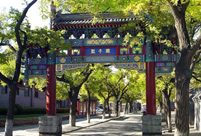 Featured hutongs in Beijing
Featured hutongs in Beijing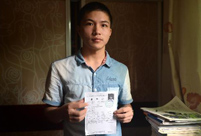 Separate college entrance exam
Separate college entrance exam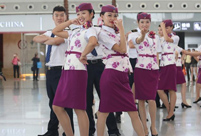 Flash mob dance
Flash mob dance Picturesque scenery of Ghost City
Picturesque scenery of Ghost City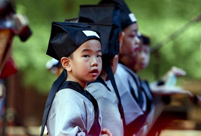 Children attend First Writing Ceremony
Children attend First Writing Ceremony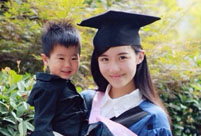 Female master poses for graduation photos with son
Female master poses for graduation photos with son Silk Road, China's Grand Canal listed as World Heritage Sites
Silk Road, China's Grand Canal listed as World Heritage Sites PKU students imitate famous paintings in real-person photos
PKU students imitate famous paintings in real-person photos Chinese 'Slumdog Millionaire'
Chinese 'Slumdog Millionaire' Islands in S. China Sea better shown on new vertical atlas of China
Islands in S. China Sea better shown on new vertical atlas of China Girl takes father’s portrait to travel the world
Girl takes father’s portrait to travel the world Images of Xi'an: Part one
Images of Xi'an: Part one In Pictures: Female fans of World Cup
In Pictures: Female fans of World Cup Top 20 hottest women in the world in 2014
Top 20 hottest women in the world in 2014  China's top 10 representative architectures
China's top 10 representative architecturesDay|Week|Month